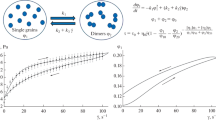Abstract
The balance equation describing the deactivation of an enzyme in soluble form under perfect stirring conditions when the enzyme undergoes a dimerization process was written and analytically solved in dimensionless form. The effect of four relevant parameters on the concentration of active enzyme sites under the assumption that a typical steam-heating scheme is followed was described and discussed. Dimerization always brings about faster decay of enzyme activity, and this effect is enhanced by elapsing time and by small ratios of the time scale associated with enzyme decay to that associated with heat transfer.
Similar content being viewed by others
Author information
Authors and Affiliations
Additional information
Received: 19 March 1996
Rights and permissions
About this article
Cite this article
Barros, R., Malcata, F. The effect of dimerization on the heat ability of soluble enzymes. Bioprocess Engineering 16, 45–49 (1996). https://doi.org/10.1007/s004490050286
Issue Date:
DOI: https://doi.org/10.1007/s004490050286




